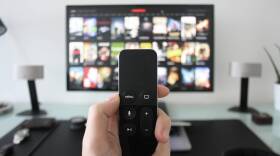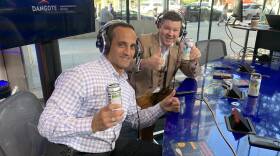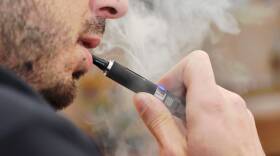EXPLORE MORE
BPR is on tape for the holidays! We'll be back live Monday Jan. 5th
Recent segments
-
What To Watch This Week With Bob Thompson
Thompson's best, worst, and what to watch this week all come from network TV. -
Meredith Goldstein: How To Know If You've Found Your True Love
Goldstein's new season of the Love Letters podcast explores how to tell if you've found 'the one.' -
Callie Crossley On The Carson King Controversy
The roller-coaster controversy has some people wondering how far "cancel culture" will go. -
Raj Chetty: Access To The American Dream Isn't Just Determined By Income. Geography Matters
Even with housing assistance, many families need more help to move into high-opportunity areas, Chetty said. -
BPR News Quiz: Pindrop Sessions Edition
Somerville Mayor Joseph Curtatone and Aeronaut's Jason McCool joined us for our weekly news quiz. -
Shirley Leung: 'Better To Be Safe Than Sorry' On Vaping
The governor has faced criticism for imposing a four month ban on vaping devices, but the Boston Globe business columnist said she thinks Baker made the right call.
Listen to previous shows
-

BPR Full Show: Bits and Pits
Today on Boston Public Radio: We opened the lines to get listener reactions to Tom Brady announcing his retirement from football. Medical ethicist Art Caplan discussed a new report in JAMA about greed in the US healthcare system, our worsening health outcomes, and new FDA guidelines on who can give blood. National security expert Juliette Kayyem discussed the police killing of Tyre Nichols, and the progression of Trump's legal case in Manhattan. Michael Kirk, director of Frontline's latest film "Putin and the Presidents," discussed the film's examination of Russian President Vladimir Putin's quest for Russian dominance through the lens of multiple American presidencies. Food policy writer Corby Kummer discussed the much anticipated Comfort Kitchen opening in Boston, inflation drawing a new generation of bakers to the bread machine, and the legacy of Four Loko. Naturalist and author Sy Montgomery discussed animals genetically modifying themselves to adapt to life in the city, and wildlife advocates urging regulators to do more to protect cephalopods given their intelligence. We opened the lines to hear from listeners about how often they shower. -

BPR Full Show: The Bet Is On
Today on Boston Public Radio: We opened the show with a call-in session to ask our listeners how they feel about the official launch of legal sports betting in Massachusetts. On Tuesday morning the state’s three casinos — Plainridge Park, MGM Springfield, and Encore Boston — began accepting bets on a wide range of competitive sports. The law doesn’t allow betting on high school sports, local college teams and e-sports. Trenni Casey joined to talk about the upcoming Super Bowl showdown between the Philadelphia Eagles and the Kansas City Chiefs, allegations that Harvard’s women’s hockey coach created an abusive and toxic locker room environment and the opportunity for a professional women’s soccer team to once again play in Boston. Trenni Casey is an anchor and reporter with NBC Sports Boston and a Boston Public Radio contributor. Gov. Maura Healey came down to the Boston Public Library for an in-person edition of “Ask the Governor,” fielding questions from the audience and Jim and Margery. During the segment, Healey said she would not offer a position on whether public employees should have the right to strike in reference to the teachers’ work stoppage in Woburn. She also said that she supports the city of Boston having a seat on the MBTA’s Control Board, a priority for Mayor Michelle Wu. Jared Bowen came on to discuss the Japanese prints at the Worcester Art Museum, “The Art of Burning” at the Huntington and why White Lotus’ season two theme song is playing at the club. Bowen is GBH’s executive arts editor and the host of Open Studio. Boston Mayor Michelle Wu took questions in the latest edition of “Ask the Mayor” from the Boston Public Library. She discussed the lack of affordable practice spaces for artists and musicians and said that her administration is directing federal pandemic funding towards expanding artist space in Boston. She also addressed the challenges that weather fluctuations present to maintaining safe and pothole-free streets. Wu also talked about the challenges of finding reliable bus transportation for Boston Public School students. Wu is the mayor of Boston. -

BPR Full Show: Tyre Nichols' Killing Renews Calls For Justice, Police Reform
Today on Boston Public Radio: We started the show by taking our listeners’ calls to ask how they felt about the widespread broadcast of the video depicting Memphis police officers violently beating Tyre Nichols. We also asked listeners about whether the police reforms implemented following George Floyd have had any meaningful impact. Then GBH news analyst Charlie Sennott came on to discuss the political brinkmanship between the U.S. and Germany that led to both countries giving tanks to Ukraine. He also predicted that the war will continue for months because the Russian government has been effective in generating support for the invasion by misrepresenting how successful its military has been on the ground. Charlie Sennott is the founder of The GroundTruth Project and is a GBH News Analyst. Michael Curry, the CEO of the Mass League of Community Health Centers, discussed the limitations of police reform efforts following the release of the body cam footage showing officers violently attacking Tyre Nichols. Curry argued that there is too much deference and trust in police departments among the public and media. He also argued in support of continuing to diversify police forces, saying that impact will take time to materialize. Michael Curry is the President and CEO of the Massachusetts League of Community Health Centers. He’s also a Member of the National NAACP Board of Directors, where he chairs the board’s Advocacy & Policy Committee. Mass Teachers Association president Max Page discussed the push among teachers unions to change a Massachusetts law that bans public employees from going on strike. He also discussed the ongoing teacher strike in Woburn as educators there push for better wages for paraprofessionals and smaller class sizes. Page also discussed the potential impact of the Fair Share Amendment, a ballot question that passed this fall which changed the state Constitution mandating an additional 4 percent tax on earnings more than 1 million dollars and earmarking that revenue for transportation and education. Revs. Irene Monroe and Emmett Price discussed the limitations of police reform and the need for change in police training around the perceptions and stereotypes of young black men. The Reverends also discussed a statement released by Patrick Clancy, the father of the three children who were killed by their mother during a bout of postpartum psychosis, which asked for forgiveness for his wife. The Revs also discussed Pope Francis’s comments that homosexuality is a sin but not a crime. Reverend Irene Monroe is a syndicated religion columnist and the Boston voice for Detour’s African American Heritage Trail and co-host of the All Rev’d Up podcast. Emmett G. Price III is founding pastor of Community of Love Christian Fellowship in Allston, the Inaugural Dean of Africana Studies at Berklee College of Music and co-host of the All Rev’d Up podcast. V, formerly known as Eve Ensler, discussed her new book “Reckoning” and the 25th anniversary of "V Day", which is a day dedicated to ending violence against all women, trans women and non-binary people. We ended the show with a call-in session asking our listeners how they feel about dining out alone. -

BPR Full Show: Chocolate Public Radio
Today on Boston Public Radio: Sen. Elizabeth Warren spoke about a looming political battle in Congress over whether to raise the U.S. debt ceiling, the state of child care in the Commonwealth, and what she made of the recent Ticketmaster antitrust Congressional hearing. We opened phone and text lines to talk with listeners about their experiences with child care in Massachusetts. Hon. Nancy Gertner discussed the Memphis police killing of Tyre Nichols, reports of discord among the Supreme Court justices, and questions of whether there ought to be more oversight of the Judicial Branch. Callie Crossley offered her own perspective on the killing of Nichols, as well as racist remarks made about former Transportation Secretary Elaine Chao by former President Donald Trump, and Springfield-native Ruth Carter getting an Oscar nod for her constume design work on “Black Panther: Wakanda Forever.” Sue O’Connell offered her perspective on the latest conversy with Rep. George Santos, and the difference between dressing in drag and being a formal “drag queen.” She also spoke on growing transphobia in the U.K., and why she thinks a recent M&M’s re-brand is yet another marketing ploy. O’Connell is co-publisher of Bay Windows and South End News and contributor to Current, on NBC L-X and NECN. Sue O'Connell on BPR | Jan. 27, 2023 Victoria Kichuk is the founder and owner of Cocoa Beantown, a Boston-based chocolate tour and tasting company. She joined for a tasting of some high-quality chocolate brands based in Massachusetts. We closed out the show with listeners, getting your thoughts on bugs & and bug-eating. -

BPR Full Show: A Holographic Holocaust Museum Is Coming To Boston
Today on Boston Public Radio: NBC political director Chuck Todd joined to discuss the latest national politics. Then we opened the lines to discuss new guidance from the American Academy of Pediatrics recommending immediate intervention as early as two years old to combat childhood obesity. Boston Globe business columnist Shirley Leung discussed Boston Mayor Michelle Wu’s first state-of-the-city address, and the mayor’s pledge to overhaul the Boston Planning and Development Agency. 93-year-old Holocaust survivor David Schaecter discussed the process to have his life story recorded for a holographic video display at the planned Boston Holocaust Museum, slated to open in 2025. Museum co-founder Jody Kipnis and Michael Berenbaum, holocaust scholar and museum designer, discussed the plans for the museum. Boston Globe TV critic Matthew Gilbert discussed the shows he’s watching this winter, and Netflix’s impending crackdown on account sharing. Chef Irene Li from Mei Mei joined to give Jim and Margery a dumpling-making lesson, in celebration of the Lunar New Year, and discussed Mei Mei’s reopening as a dumpling factory and café in South Boston. We closed the show talking with listeners about sleepovers.









